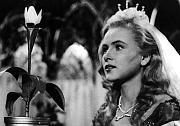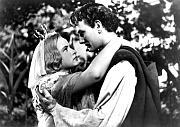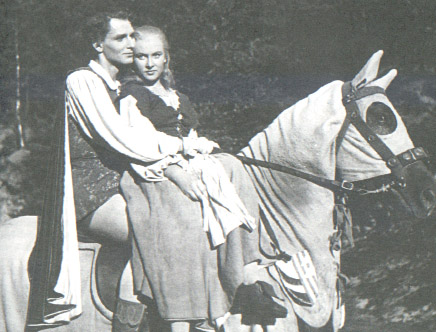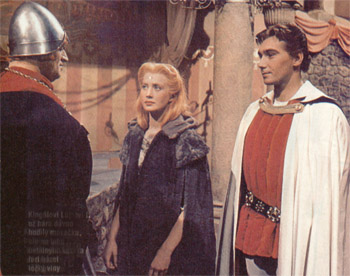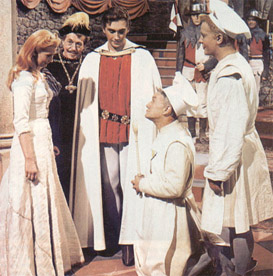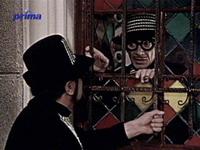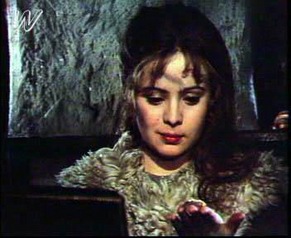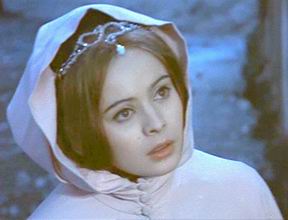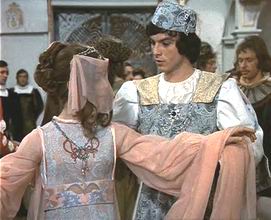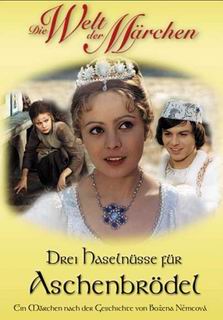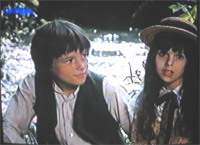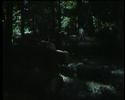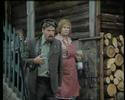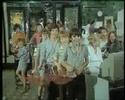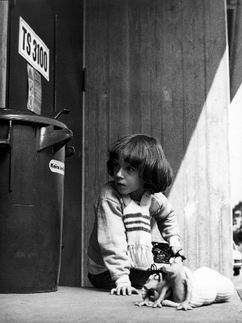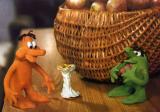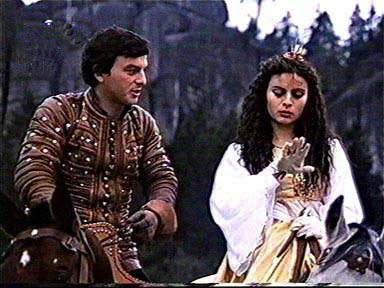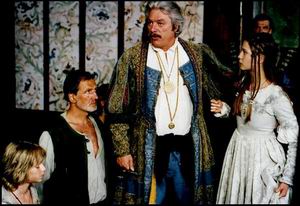If there was a film genre, where Czechs could proclaim theirselves as one of the best in the world (if not the best, at least temporarily), it was children's cinematography. The row of beautiful fairy-tales and movies or serials for children begins in 1952, when Bořivoj Zeman filmed his Proud Princess. A big part of the best works came into being during the fifties and sixties, especially thanks to Bořivoj Zeman and Karel Zeman, two namesakes that had nothing in common except their surnames. In the seventies they were successfully substituted by director Václav Vorlíček and his "court" screenwriter with unbelievable fancy Miloš Macourek, who has written a lot of very successful movies and serials. At the same time, Jindřich Polák and Ota Hofman started their legendary serial Pan Tau (Mr. Tau) and Věra Plívová-Šimková began as a director of unforgettable movies about children.
Among all the listed movies below I would draw the attention to two pieces that I personally regard as the most successful ones: Vorlíček's fairy tale Tři oříšky pro Popelku (Three Nuts For Cinderella) that became a cultic Christmas movie not only in Czech republic, and Plívová-Šimková's free adaptation of Mark Twain's Tom Sawyer called Páni kluci (Boys The Masters). These two titles would be followed by Byl jednou jeden král (Once Upon A Time There Was A King), Pyšná princezna (The Proud Princess), Dívka na koštěti (The Girl On The Broom) and maybe Šíleně smutná princezna (The Princess Sad Like Crazy) and Princezna se zlatou hvězdou (The Princess With The Golden Star). Zeman's Cesta do pravěku (The Journey Into Prehistory) should be listed here as well. I think that in the future I will add at least another 5 titles to the list.
I would recommend a very good article about the tradion of Czech fairy tales:
'Once upon a time' - A look at the Czechs' fairytale obsession
18 movies included (another will be added in the future)
Pyšná princezna (1952)
(The Proud Princess)
Byl jednou jeden král (1954)
(Once Upon A Time There Was A King)
Cesta do pravěku (1955)
(The Journey To Prehistory)
Hrátky s čertem (1956)
(Playing With The Devil)
Princezna se zlatou hvězdou (1959)
(The Princess With The Golden Star)
Ukradená vzducholoď (1966)
(The stolen airship)
Šíleně smutná princezna (1968)
(The Princess Sad Like Crazy)
Dívka na koštěti (1971)
(The Girl On The Broom)
Tři oříšky pro Popelku (1973)
(Three Nuts for Cinderella)
Páni kluci (1975)
(Boys the Masters)
Malá mořská víla (1976)
(The Little Mermaid)
Jak se budí princezny (1977)
(How Princesses Can Be Waken Up)
Ať žijí duchové! (1977)
(Long Live the Ghosts!)
Tajemství ocelového města (1978)
(The Secret of the Steel City)
Princ a Večernice (1978)
(The Prince and the Evening Star)
Za humny je drak (1982)
(A Dragon Is Beyond Village Backyards)
Tři veteráni (1983)
(Three veterans)
Lucie, postrach ulice (1984)
(Lucy, the Terror to the Street)
Pyšná princezna (1952)
(The Proud Princess)
Director: Bořivoj Zeman. Screenplay: Bořivoj Zeman, Henryk Bloch and Oldřich Kautský. Based on a fairy-tale Potrestaná pýcha (Punished Proudness) written by Božena Němcová. Music: Dalibor C. Vačkář. Lyrics of songs: František Hrubín. Starring: Alena Kohoutová (princess Krasomila), Vladimír Ráž (king Miroslav), Stanislav Neumann (the king of the Midnight Kingdom), M. Sýkorová (the nanny), Jaroslav Seník (minister Jakub), Miloš Kopecký (the chancellor), Oldřich Dědek (the marshal), Karel Effa (the guard of the royal treasure), Josef Hlinomaz (the tax-gatherer), Bohuslav Čáp (the tailor).
The proud princess must get rid of her proudness to keep the singing flower alive ...and then decides to flee with her beloved "gardener". Miroslav and Krasomila: the story ends. In the beginning young king Miroslav wants to find a wife. His advisors recommend him beautiful princess Krasomila, who lives in a neighbouring Midnight Kingdom, and Miroslav sends his picture there. However, the princess is a cocky girl and she refuses him without looking at his portrait. Miroslav then decides to leave his country and, in secret, to get to the royal court in the Midnight Kingdom. The Midnight Kingdom is a sad country, where taxes are paid one-year ahead and a weak old king is controlled by corrupt ministers, who terrorize people and make absurd laws like prohibition of singing and dancing. Miroslav is employed at the court as a gardener and he finds that Krasomila is a pamper, arrogant girl, who seems hard to change. However, he meets her old nanny, who explains him that originally she had been a very good girl, but she was tainted by the bad ministers. She recommends him to learn a song that she sang her during her childhood. Thanks to this song and a singing flower the princess gradually gets rid of her proudness and she falls in love with him. After some time the ministers remark Miroslav's "bad influence" on the princess and Miroslav is forced to leave the court. Krasomila decides to go with him and they are subsequently pursuaded by the royal army (resembling rather a gang of bandits). In the end, the bad ministers are prisoned, absurd laws are cancelled and Krasomila, who learns that Miroslav is a king, becomes his queen.
The Proud Princess is the first fairy-tale of Bořivoj Zeman, a classic masterpiece that is regarded as the "fairy-tale of all Czech fairy-tales". The number of spectators that have visited this movie since September 1952 is 8,222 million, which is by far the most successful movie that has ever appeared in Czech movie houses after 1945. Naturally, this number can never be overcome because of the start of TV in 1955. However, The Proud Princess is still one of the most popular movies in the country and it is a stable inventary of Christmas TV programmes. What's behind its magic? I think that it is the right mix of fairy-tale and archetypal motives that strongly influences human soul. It is so well done that a lot of people even think that this movie is in color, although it is only black & white (unfortunately, in the era of communistic propaganda movies, nobody wanted to give a color material to "some fairy-tale"). The atmosphere, scenery and music is such that it envokes some Oriental legends and fairy-tales. Zeman also added a lot of intelligent humour and some scenes, where especially the old doting king (Stanislav Neumann) acts, became later legendary. It's also worth note that except the singing flower, this movie actually contains no supernatural elements. The title song Rozvíjej se poupátko (Blossom, bud, blossom) is a classic as well and can't be left out in connection with the Proud Princess.
A note to the actors: During the filming of this movie both title heroes fell in love, which meant a crash of their existing marriages. Their own marriage that they concluded subsequently also didn't last too long. Alena Kohoutová was later again married and as an actress she is known as Alena Vránová. The movie was one of the first noticeable appearances of Miloš Kopecký as the corrupt chancellor.
|
See some clips:
|
Byl jednou jeden král (1954)
(Once Upon A Time There Was A King)
Director: Bořivoj Zeman. Screenplay: Bořivoj Zeman, Jiří Brdečka, Jan Werich. Based on a fairy tale Sůl nad zlato (Salt over Gold) written by Božena Němcová. Music: Václav Trojan. Starring: Jan Werich (the king), Vlasta Burian (chancellor Atakdále), Milena Dvorská (Maruška), Stella Májová (Zpěvanka), Irena Kačírková (Drahomíra), František Černý (the cooker), Lubomír Lipský (the Brave prince), Miloš Kopecký (the Clever prince), Miroslav Horníček (the Neat prince), Terezie Brzková (the old woman), Vladimír Ráž (the fisher).
A king, who calls himself "I the First", wants to know, who of his three daughters loves him most. The youngest of them, Maruška, states that she loves him like salt. The king is flamed up, because salt is just a "worthless mineral", and he expels her out of the palace. Maruška puts up at a wise old woman and then falls in love with a young fisher. In the meantime the king mourns for what he did, but he wants to prove that he was true and orders to destroy all salt in the kingdom. Eventually he learns that he was wrong and gets rid of his proudness.
Another fairy-tale attempt of Bořivoj Zeman, again very successful (actually the second most successful movie in Czech theatres of all time), that can be called a classic of Czech cinematography. Werich's participation was a guarantee of intelligent and wise humour. Especially the scene, where the king and his chancellor cook pancakes without salt (see the picture on the right) became legendary as well as typical "Werichian" wise cracks ("One egg or two eggs are three eggs"; "How many?" - "Appropriately."). By the way, the part of the chancellor was the biggest role of the "fallen comician" Vlasta Burian after WW II.
Cesta do pravěku (1955)
(The Journey To Prehistory)
Direction: Karel Zeman. Screenplay: Karel Zeman, J. A. Novotný. Music: E. F. Burian. Starring: Vladimír Bejval (Jirka), Petr Hermann (Toník), Josef Lukáš (Petr), Zdeněk Husták (Jenda).
A legendary movie of Karel Zeman (not to confuse with Bořivoj Zeman!), who began a famous career as an author of very original sci-fi spectacles. Today I find the story a little bit naive, but the movie is still exciting and the original treatment of trick scenes deserves attention even after years.
The movie begins when four boys find a fossil of a trilobite and decide to undertake an exciting journey into prehistory that leads down a river flowing into a cavern. They sail on a little boat and gradually get from Quaternary as far as to Primary. They met a lot of prehistoric creatures and experience exciting adventures.
Hrátky s čertem (1956)
(Playing With The Devil)
Direction: Josef Mach. Screenplay: Josef Drda, Josef Mach (after a theatre play of Josef Drda). Music: Jiří Srnka. Starring: Josef Bek (Martin Kabát), Eva Klepáčová (Káča), Alena Vránová (Dišperanda), František Smolík (Školastykus), Jaroslav Vojta (Sarka Farka), Josef Vinklář (Lucius), Bohumil Záhorský (the king), Stanislav Neumann, František Filipovský (the devils), Ladislav Pešek (Belzebub), Vladimír Ráž (Solfernus).
Another Czech fairy classic from the fifties, shot in beautiful decorations made after paintings of Josef Lada. And another film princess for Alena Vránová. The story begins in a deep wood that is inhabited by old monk Školastykus, occassionally visited by princess Dyšperanda, who is desperately looking for a husband. Since she is not successful, she joins her chamber-maid Káča, who has the same problem, and together they underwrite an obligation to young devil Lucius, who primises filling their most courageous dreams. In the other part of the wood, we meet war veteran Martin Kabát, a fearless man, who improves wood bandit Sarka Farka, and eventually comes to a ruin of an old mill occupied by two old devils. Their haunting makes no impression on him, too, but the hardest test of his courage is still before him: he must save Dišperanda's and Káča's souls that now belong to the hell...
A movie that is mostly playful and humorous, but ends almost horrorously (at least for children). By the way, it was the seventh most successful Czech movie of the fifties, and until today it is very popular and runs repeatedly on TV, especially around Christmas. Josef Bek in the role of Martin Kabát is unforgettable and personifies optimism, with which he was endowed even in his real life.
Princezna se zlatou hvězdou (1959)
(The Princess With The Golden Star)
Director: Martin Frič. Screenplay: Martin Frič, K. M. Walló. Based on a fairy-tale written by Božena Němcová. Music: Bohuslav Sedláček. Lyrics of songs and dialogues: K. M. Walló. Starring: František Smolík (king Hostivít), Martin Růžek (king Kazisvět), Marie Kyselková (Lada), Josef Zíma (prince Radovan), Jarmila Kurandová (the nanny), Stanislav Neumann (the cooker), Josef Vinklář (the cookie), Eduard Kohout (the marshal).
Once upon a time there was a kingdom of old king Hostivít. He had a daughter called Lada, who was born with a golden star on the forehead. When the princess has grown up, a royal suitor, king Kazisvět (The Spoiler), came to the kingdom and asked for the princess' hands. However, the king was bad and ugly, and when the princess refused him, he began to threaten with a war. Since the princess wanted to save her country, she followed the advice of her nanny and eloped from Kazisvět to the neighbouring kingdom of prince Radovan, dressed into a coat of mouse fur in which everybody regarded her as ugly. Then she found a job at the royal court in the kitchen, where the cookers gave her a name "the Mouse Coat". When there was a dance ball at the castle, she appeared dressed in wonderful clothes and the prince fell in love with her. He gave her his ring, but in the end of the evening she ran away and the prince was worried, who she was.
Kazisvět just finds out that the ugly Mouse Coat was the beuatiful princess. Martin Růžek as Kazisvět, Marie Kyselková as Lada-the Mouse Coat and Josef Zíma as Radovan. The cooker (kneeling) was another amazing role of Stanislav Neumann after the king in Pyšná princezna. On the right Josef Vinklář (very young) as a cookie.
The next day king Kazisvět came to Radovan's country looking for Lada. At the same time Lada lost the ring that had fallen into a soup prepared for the prince. The prince found it there and send for cookers, who prepared the soup. So he found Lada to immense surprise of all cookers. However, Kazisvět just arrived to the castle and asked for the princess, who was to hide there. He refused Lada dressed as the Mouse Coat, but when he realized his error, he demanded her by force. Radovan beats him in a single combat and presently Lada's nanny is coming with news that just before Kazisvět had been beaten in Hostivít's country. The dishonoured Kazisvět runs away and the story ends with a marriage and a happy end.
Another good fairy-tale exuberating by rich colors and costumes. However, the dialogues are written in verses, which not everybody likes. Some scenes are lyric and quite boring. Despite that it is still the third most successful movie in the history of Czech cinema (5 million spectators). Recently I noticed that it was repeatedly presented on German TVs during Christmas.
A note: I don't know the exact occupation of Marie Kyselková; I know only two movies, where she acted (the second one was made in 1955). Several years ago she appeared in a TV programme about Czech fairy-tailes, but they didn't specify anything about her life. Josef Zíma was a popular singer of that time, not an actor (besides, he sings here). I don't remember any of his other film roles, except episodes in musicals.
Ukradená vzducholoď (1966)
(The stolen airship)
Direction: Karel Zeman. Screenplay: Karel Zeman, Radovan Krátký. Based on the novel Two Years' Holidays by Jules Verne. Music: Jan Novák. Starring: Michal Pospíšil (Jakoubek Kůrka), Hanuš Bor (Tomáš Dufek), Jan Čížek (Martin), Josef Stráník (Pavel), Jan Malát (Petr), Jitka Zelenohorská (Katka), Čestmír Řanda (Findejs), Josef Haukvic (Forbes), Josef Větrovec (the captain), Jan Teplý (Walstone), Rudolf Deyl jr. (Tenfield).
Karel Zeman modified the well known novel of Jules Verne and removed it into Prague in 1891, where five boys steal an airship and get as far as to the Pacific, where they enjoy exciting adventures on an exotic island. Another Zeman's movie using his original artistic style.
Šíleně smutná princezna (1968)
(The Princess Sad Like Crazy)
Direction: Bořivoj Zeman. Screenplay: František Vlček, Bořivoj Zeman. Music: Jan Hammer jr. Starring: Helena Vondráčková (the princess), Václav Neckář (the prince), Jaroslav Marvan (king Jindřich), Bohuš Záhorský (king Dobromysl), Josef Kemr (Iks), Darek Vostřel (Ypsilon), František Dibarbora (the headsman), Stella Zázvorková (the nanny).
A young prince, son of king Jindřich, is to marry daughter of king Dobromysl. However, he makes off during a journey to Dobromysl and later reaches the king's castle, where he in secret wants to learn something about his future wife. He meets a girl, who turns out to be the princess, and is subsequently prisoned in a dungeon. The princess doesn't know that he is the prince and she falls in love with him. Since she wants to marry him, the only way how to achieve it is to pretend that she is sad and she will offer her hands only to a man, who will make her happy (to him).
However, then she finds out that the boy in the prison, who is to be soon executed, is a prince, and his momentary situation will cause a war between the two kingdoms that is eagerly supported by royal ministers Iks and Ypsilon. In the end, Iks and Ypsilon are neutralized, the war ends and the prince with the princess celebrate a wedding.
Another (third) fairy-tale of Bořivoj Zeman, not so successful like his previous ones, but still exceptionally good (2,9 million spectators) and filled with beautiful music composed by Jan Hammer, who later emmigrated and became a respected music composer even in the West. Václav Neckář and Helena Vondráčková were members of a music group the Golden Kids (together with Marta Kubišová) and very popular singers of that time (Vondráčková is still one of the most popular singer-women in Czech republic, especially after her recent comeback). Only in the enormously obese Neckář nobody would recognize somebody, who once performed a prince (however, he lost 30 kgs recently).
A part of the soundrack of Šíleně smutná princezna is available on Zvukové úryvky a obrázky z českých filmů www.meteleskublesku.cz
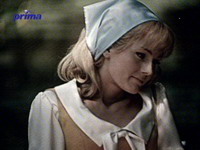
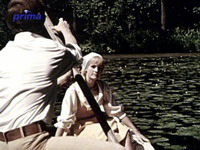
Clips from
HIGHLY RECOMMENDABLE!
Znam jednu starou zahradu (I Know An Old Garden)
Já už to vím (I Know It Already!)
Slza s tváře padá (A Tear Is Falling From The Face)
Znám jednu krásnou princeznu (I Know A Beautiful Princess)
Dívka na koštěti (1971)
(The Girl On The Broom)
Director: Václav Vorlíček. Screenplay: Miloš Macourek, Václav Vorlíček. Music: Angelo Michajlov. Lyrics of the title song: Pavel Kopta. Sung by Petra Černocká. Starring: Petra Černocká (Saxana), Jan Hrušínský (Honza), Vladimír Menšík (the vampire), Jan Kraus (Miky), Vlastimil Zavřel (Adámek), Michal Hejný (Bujnoch), Jaromír Spal (Bláha), Vlastimil Hašek (Pešek), František Filipovský (Rousek), Zdeněk Dítě (the director), Jana Drbohlavová (the teacher), Josef Bláha (the director of the magic school), Jan Libíček (the psychiatrist), Jaroslava Obermeierová (the nurse).
In the beginning we get into the world of fairy-tales, or to a schoolroom of young witches, respectively. Young pupil Saxana just failed in a magic test and she must spend the next 300 years in detention. She is attracted by a narration of a vampire, who once visited the human world, and so she decides to steal the Book of Magic and get from the World of Fairy-Tales to learn more about humans. Here she finds herself in a school and meets a young boy called Honza. She asks him for an Old Woman's Ear, because the vampire told her that if she eats it, she can stay here forever. Otherwise she will return back to the World of Fairy-Tales after 48 hours (and will stay in detention). Since Honza can't help her, she joins a trio of louts, Honza's schoolmates, who promise it to her. More concretely, they promise her an ear of their hatred teacher. But that's only a trap, because they want to steal Saxana's Book of Magic. Eventually they really succeed and cause almost a disaster in the town. However, after a wild pursuit Honza and Saxana will get the book back and, in the end, Saxana learns that the Old Woman's Ear is a herb. Fortunately, the director of the school has an infusion of the Old Woman's Ear and in the last minute Saxana will drink it, because she fell in love with Honza.
"Saxana" is the first attempt of Vorlíček & Macourek in the genre. The movie - actually a little bit crazy comedy - was very successful even abroad and Vorlíček once said that the idea of the World of Fairy-Tales had attracted attention of West German producers, who had offered the "magicians from Prague" to create another title of this sort. It had lasted 9 years until Vorlíček & Macourek created Arabela (1980).
Petra Černocká, who also sings the title song, was a very popular young singer of that time. She performed the role very nicely! Jan Hrušínský, son of Rudolf Hrušínský sen., later acted in another Vorlíček's fairy-tale Jak se budí princezny (How princesses can be waked up, 1977). Jan Kraus and Vladimír Zavřel, the performers of rascals, later became known actors (especially Kraus now enjoys big popularity after his comeback in the end of the nineties).
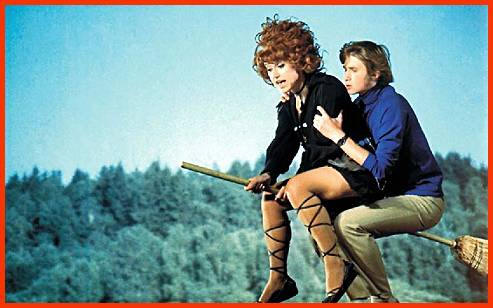
Since I still haven't prepared any own trailers, I must recommend a short passage from a German page. It's dubbed in German, but it's better than nothing, after all.
Saxana is just undertaking a school test...
http://www.kika.de/_asx/vorgucker/das_maedchen_auf_dem_besenstiel.asx
The title song on http://filmovezvuky.fdb.cz/divka-na-kosteti/
http://filmovezvuky.fdb.cz/divka-na-kosteti/zvuky/01.zip
And something from
Tři oříšky pro Popelku (1973)
(Three Nuts for Cinderella)
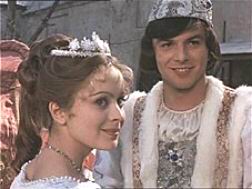
Director: Václav Vorlíček. Screenplay: František Pavlíček (not listed in the titles because of his problems with the communistic regime), Václav Vorlíček. Based on a fairy-tale written by Božena Němcová. Music: Karel Svoboda. Lyrics of Kdepak ty ptáčku hnízdo máš: Jiří Štaidl. Sung by Karel Gott. Starring: Libuše Šafránková (Popelka/Cinderella), Pavel Trávníček (the prince - speaks Petr Svojtka), Carola Braunbock (mother - speaks Jaroslava Adamová), Rolf Hoppe (the king - speaks Otto Šimánek), Karin Lesch (the queen - speaks Vlasta Fialová), Daniela Hlaváčová (Dora), Jan Libíček (the preceptor), Vladimír Menšík (Vincek).
Only The Proud Princes and Once upon a time there was a king could compete with "Cinderella", if we wanted to find the best Czech fairy-tale of all time. This amazing spectacle with wonderful music of Karel Svoboda is probably the best work of director Václav Vorlíček, although we could also list several of his successful comedies and fairy-tale movies or serials.
Cinderella was created in co-production with East Germany, because director Vorlíček wanted to realize his dreams about an ecquisitely staged spectacle, for which he didn't get enough money. The East Germans added 1 million marks and bespoke casting several roles by their actors (the king and the queen, the stepmother). At first they intended to film it in summer, but due to certain complications it was decided to try landscapes covered with snow, which eventually added a useful magic. The filming was not easy and was characterized by a desperate lack of snow. Some of the first scenes were made in East Germany (the castle is Moritzburg near Dresden) and the landscape around the castle had to be covered by artifical snow. After the whole crew has moved to Šumava (the castle Švihov, Klatovy and Železná Ruda), there was, on the contrary, too much snow. Pavel Trávníček once said that the only thing that he remembers from the filming was a cruel frost. For Libuše Šafránková it was the second film experience (after a TV movie Babička/The Grandmother, 1971, that was based on Božena Němcová's biography), but Pavel Trávníček was still an unexperienced student of the actor's academy in Brno.
The classical story of Cinderella is actually a little bit arranged (Cinderella visits the castle ball only once), but it really didn't harm the final result. There are many things that could be called perfect. At first, the main characters were chosen excellently - Pavel Trávníček is almost an archetype of a fairy-tale prince and the look of Libuše Šafránková needs no other comment. Further, Karel Svoboda composed a legendary music accompaniment including the title song Kdepak ty ptáčku hnízdo máš (Bird, where do you have your nest) sung by Karel Gott (However, this song isn't contained in one of German versions, because Karel Gott shortly before collaborated on the animated serial Die Biene Maja and the German TV that financed it disliked Gott's engagment in Cinderella and cut him out). Unfortunately, Jiří Štaidl, the author of its lyrics, a very gifted young man, died soon after. The rich costumes appearing in this movie were designed by Theodor Pištěk (jr.), who later got an Oscar for Forman's Amadeus. The camera work is also excellent. The success of "Popelka" overcame all expectations (2,85 million spectators) and was remarkable even abroad, especially in German-speaking countries. In some countries Cinderella has become something like "a cultic Christmas movie" (for example, in Germany it ran more than 20-times - which is allegedly a non-official record of a foreign movie - and in Norway more than 15-times). I also know that some foreign versions (i.e. that presented in the Great Britain) were arranged and cut, but I think it was not necessary.
Cinderella is the life's role of Libuše Šafránková. The prince was actually the first big role of Pavel Trávníček, who later performed princes in another fairy-tales. Again together they appeared 9 years later in Moskalyk's Třetí princ (The Third Prince).
Although Václav Vorlíček later continued in making fairy-tales, it is true that Tři oříšky is by far his best work. However, except Dívka na koštěti (The Girl On The Broom) I think that there are at least two titles that are worth mentioning: a humorous fairy-tale Jak se budí princezny (How Princesses Can Be Waken Up) that he filmed four years later and again successfully collaborated with Karel Svoboda, who composed beautiful music, and Princ a Večernice (The Prince And The Evening Star), which is a dramatic story containing no trace of Vorlíček's usual humour.
Fan Pages
Until recently, there existed quite an informative German page Drei Haselnüsse für Aschenbrödel (http://www.drei-haselnuesse-fuer-aschenbroedel.de) containing a lot of music, but it seems that it doesn't exist anymore. However, there is another, really very nice German site (in English) Three Nuts For Cinderella (http://www.dreihaselnuessefueraschenbroedel.de/)
Soundtrack
Actual information about the current state of the soundtrack preparation and publishing:
http://www.dreihaselnuessefueraschenbroedel.de/htmls_e/
Trailer
A nice trailer (39 MB)
http://www.dreihaselnuessefueraschenbroedel.de/htmls/lothar.mpg
A modern remake of music
http://www.dreihaselnuessefueraschenbroedel.de/htmls/thomas2.mp3
Don't be sad, Cinderella!
http://www.dreihaselnuessefueraschenbroedel.de/htmls/thomas1.mp3
...and of course..."Kdepak ty ptáčku hnízdo máš"!
http://filmovezvuky.ic.cz/mp3/74_tri_orisky_pro_popelku.mp3
A DVD in German is available on www.amazon.de
YouTube is virtually loaded with clips from Cinderella, so I will list my own contributions:
Coming to the Ball
"Kdepak ty ptáčku hnízdo máš..."
At the Ball
The dancing with the prince is undoubtedly
one of the best passages of the film.
Happy End
...like in every fairy-tale, after all.
Comments on www.imdb.com
(very complimentary)
Páni kluci (1975)
(Boys the Masters)
Director: Věra Plívová-Šimková. Screenplay: Vít Olmer. Based on Mark Twain's Adventures of Tom Sawyer. Music: Petr Hapka. Lyrics of the title song: Zdeněk Rytíř. Sung by Václav Neckář. Starring: Michal Dymek (Tomáš), Petr Voříšek (Hubert), Petr Starý (Jožka), Magda Reifová (Blanka), Jitka Chalupníková (Andula), David Vlček (Štěpán), Bohumil Luxík (Štrůdl), Iva Janžurová (aunt Apolena), Zdena Hadrbolcová (Mrs. Vágner), Josef Somr (teacher Lopata), Petr Nárožný (the director), Karel Augusta (uncle Václav), Karel Dellapina (Ležatka), Jiří Lábus (Petr), Lubomír Kostelka (Pajdák), Vít Olmer (the sergeant), Jana Švandová (his wife).
The director Věra Plívová-Šimková, a classic Czech author of movies for children, freely adapted the world famous Twain's book and removed the story into a small north Bohemian town Levín in the beginning of the 20th century. Here the river Mississipi is substituted by a railway station, where Tomáš' uncle works as a dispatcher. Tomáš attends school in the town, but perhaps the only reason, why he every morning goes there is his beloved Blanka. He himself hates school and is a menace for both his aunt Apolena and his teacher, who often lets him in detention. Together with his friends, Hubert (=Huckleberry Finn) and Jožka, Tomáš fantasizes about an adventurous expedition to the neighbouring castle, where - according to one tale - a medieval knight buried a big treasure. His dream will come true one day, when he escapes from a classroom, where the teacher again let him in detention, and since he has nothing to lose, he persuades his friends and together with them he undertakes his dreamed-of way to the treasure. Simultaneously, a trio of criminals robs a town bank and they hide the stolen money near the castle. You will certainly think to the end, where the money eventually end. But the boys are honest and they decide to return to the town, hoping for a big reward. They are coming just at the moment of their burial, because people from the town thought that they had drown. Naturally, the criminals won't escape their reward in prison, too...
Similarly like in the case of Cinderella, some happy star must have shined over this movie. Everything here is so unbelievably good! In fact, I have never seen any other movie based on Twain's novel that could match this one. And I confess that it is one of the "movies of my heart". In contrast with Cinderella and other successful Czech movies and serials for children, I think that this title is virtually unknown abroad, which is a huge pity! It is really a masterpiece that deservedly became a classic of Czech cinematography. The atmosphere, tinged by music of Petr Hapka, is amazing and very nostalgic.
Notes: The first big role for Jiří Lábus. The performer of Tomáš, Michal Dymek, featured in another two good movies for children during the seventies. He later emmigrated to the West and returned after 1989. Magda Reifová was one of the most known child actors of that time and later studied dramatic art, but she destroyed her career, when she was expelled from the school because of notorious absences. Today she again appears in TV programmes for children.
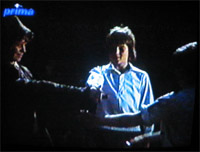
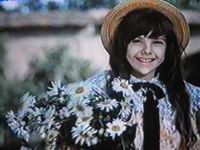
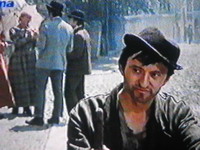
The title song Nestůj a poď (Václav Neckář): http://filmovezvuky.ic.cz/mp3/25_pani_kluci.mp3
Malá mořská víla (1976)
(The Little Mermaid)
Direction: Karel Kachyňa. Screenplay: Ota Hofman after a fairy taile of Hans Christian Andersen. Music: Zdeněk Liška. Starring: Miroslava Šafránková (the little mermaid), Radovan Lukavský (the sea king), Petr Svojtka (prince), Marie Rosůlková (grandmother), Milena Dvorská (witch), Libuše Šafránková (princess), Dagmar Patrasová (older sister), Andrea Čunderlíková (the queen of the Black Sea).
The little marmaid lives underseas together with her father, the sea king, and other spirits of the Sea Kingdom. One day her father gives her a present in the form of a royal ship that is destroyed on the coastal cliffs. But the mermaid falls in love with the prince, who was on the ship, and she saves his life. Yet the prince, who is waking up on the sea shore, mistakenly regards a foreign princess as his true lifesaver, and the little mermaid decides to leave the sea kingdom, hoping that she would win his heart...
A somewhat lyric, but still very interesting adaptation of Andersen's novel, with a bizarre, impressive atmosphere, that won attention even abroad. The scenes of the sea kingdom were filmed in the rocks of Český ráj (Czech paradise), where Antonín Moskalyk's Třetí princ (The Third Prince) was also filmed 6 years later. The title roles were casted by Šafránková sisters, Libuše and Miroslava, who did a good job. The first noticeable role of Dagmar Patrasová.
Jak se budí princezny (1977)
(How Princesses Can Be Waken Up)
Direction: Václav Vorlíček. Screenplay: Bohumila Zelenková. Music: Karel Svoboda. Starring: Jan Hrušínský (prince Jaroslav), Marie Horáková (princess Růženka-speaks Naďa Konvalinková), Vladimír Menšík (Matěj, Jaroslav's servant), Jiří Sovák (Dalimil, the king), Milena Dvorská (Eliška, the queen), Libuše Švormová (Melánie, queen's sister), František Filipovský (baron), Oldřich Velen (king Vendelín), Stella Zázvorková (queen Anežka), Jan Kraus (prince Jiří, Jaroslav's brother).
Another Vorlíček's adaptation of a classical fairy-tale, this time about the "Sleeping Beauty" (in Czech: Šípková Růženka). Melánie, sister of queen Eliška, was not invited to the christening of her niece, princess Růženka, and curses both her and the whole kingdom. At the age of seventeen, she is to be wounded by a rose thorn and the whole country will fall asleep forever together with her. The king subsequently orders to destroy all roses and thornbush in the kingdom, and hopes that he will avoid it. Seventeen years later, king Vendelín with his family comes to visit the country of king Dalimil. Vendelín's oldest son Jiří is to marry Růženka and both kingdoms are to be united. Yet bigheaded Jiří is not too sympathetic and instead of him, Růženka falls in love with his brother Jaroslav. Some time later, when she celebrates the 17th birthday, she is insidiously circumvented by her aunt Melánie, and, despite all precautions, she is wounded by a thorn, and at the moment the whole kingdom falls asleep together with her - according Melánie's curse.
When Vendelín's court hears that there are no reports from Dalimil's country, prince Jiří is not willing to undertake anything, but his brother Jaroslav feels that something wrong must have happened and together with his earthy servant Matěj, he immediately decides to set out there. After overcoming the river flooding between the kingdoms, they see only sleeping people, and the whole castle is overgrown by roses. I don't have to add that in the end, Jaroslav's love to Růženka will be stronger than Melánie's curse, and everything ends happily.
Jak se budí princezny is a fairy-tale that followed Tři oříšky pro Popelku (Three Nuts For Cinderella, 1973) in Vorlíček's fairy filmography. Although craftmanship went at least one star down (it is clearly visible in camera), it's a pity that this movie is probably little known abroad and stands in the shadow of "Cinderella". It is still very enjoyable, considerably more humorous and "relaxed", standing somewhere between a fairy-tale and a comedy (although melodramatic scenes are still present). Most fun concentrates around the figure of servant Matěj (nicely performed by Vladimír Menšík), a man "having been everywhere and knowing everything", who, unfortunately, fails to show his alleged qualities in praxis. The title role was casted by Jan Hrušínský, who was then at the top of his popularity. Karel Svoboda's music is again very nice and keeps high standard. By the way, the performer of Růženka was a non-actress, who has never appeared in any other movie.
The title song sung by Helena Vondráčková
http://filmovezvuky.fdb.cz/znelky-a-hudba1_1/mp3/jak_se_budi_princezny2.mp3
The title melody: http://filmovezvuky.fdb.cz/znelky-a-hudba1_1/mp3/jak_se_budi_princezny.mp3
Ať žijí duchové! (1977)
(Long Live the Ghosts!)
Direction: Oldřich Lipský. Screenplay: Zdeněk Svěrák, Oldřich Lipský; based on an original screenplay of Jiří Melíšek. Music: Jaroslav Uhlíř. Starring: Jiří Sovák (knight Brtník), Dana Vávrová (Leontýnka), Vlastimil Brodský (the school director), Jiří Procházka (Jenda Dlouhý), Lubomír Lipský (Jouza), Věra Tichánková (Pilátová), Igor Nachtigall (Zrzek), Petr Starý (Boháček), David Vlček (Adámek), Tomáš Holý (Vendelín).
A group of children wants to rebuild a castle ruin into a clubroom. Yet some persons from the village led by Jouza, a chief of a local shop, have different plans. Their aim is to create a big mushroom farm there. It seems that the children have only a little chance, but the castle is in hands of a ghost of knight Brtník and his daughter, who will help those, whose intentions are more honest.
Director Lipský and Zdeněk Svěrák made an excursion into fairy-tale that was exceptionally successful. The result of their collaboration was a very fresh, cheerful movie with a plenty of nice songs. This title also surprises by inventive tricks with dwarfs repairing the castle. By the way, it was the most remarkable part of little Dana Vávrová (see the picture), who is now a respected actress in Germany. Tomáš Holý got his second film role and several months later he will star as Vašek in Jak vytrhnout velrybě stoličku (How to pull the tooth out to a whale).
Instrumental version of title melody
http://filmovezvuky.fdb.cz/znelky-a-hudba1_1/mp3/at_ziji_duchove.mp3
Clips from
Tajemství ocelového města (1978)
(The Secret of the Steel City)
Direction: Ludvík Ráža. Screenplay: Ondřej Vogeltanz, Ludvík Ráža. Based on the novel of Jules Verne. Music: Luboš Fišer. Starring: Martin Růžek (dr. Sarrasin), Josef Vinklář (professor Janus), Petr Kostka (Van Hulshof), Jan Potměšil (Viktor), Jaromír Hanzlík (Marcel Zodiak/Moltke), Taťjana Medvecká (Alice), Josef Somr (Vent), Petr Čepek (Filbank), Vilém Besser (Arminius), Bořivoj Navrátil (Siniger), Josef Bláha (the captain), Čestmír Řanda (the director of the boarding house), Tomáš Holý (Sarrasin's nephew).
While doctor Sarassin has created an ideal city Fortuna, his neighbour, professor Janus, living in the Steel City, plans to construct a devastating frost bomb, with which he wants to annihilate Fortuna and seize the power over the world. Sarassin's son-in-law, engineer Marcel Zodiak, thus decides to penetrate into the Steel City and to find out as much as possible. At first he encounters youngster Viktor, whose father was murdered by Janus, and during a fight kills Janus' engineer Moltke. Since Moltke looks very much like him, Marcel pretends that he is Moltke and gets into secret underground factories under the Steel City. Janus is very satisfied with his work and Marcel wants to use his trust for another spying his plans. However, eventually he is caught and together with Viktor they are prisoned. But Marcel knows that Janus wants to annihilate Fortuna by the bomb. He must do something, or all people in Fortuna will be killed... Nevertheless, everything ends happily, because the diabolic scientist was killed by his own arrogance.
A remarkably successful adaptation of Jules Verne's novel with frosty, gloomy atmosphere augmented by effective music. It really gets your blood cold! It is one of favourite movies of my childhood.
Princ a Večernice (1978)
(The Prince and the Evening Star)
Direction: Václav Vorlíček. Screenplay: Jiří Brdečka, Václav Vorlíček. Music: Svatopluk Havelka. Starring: Vladimír Menšík (the king), Juraj Ďurdiak (prince Velen), Libuše Šafránková (the Evening Star), Radoslav Brzobohatý (Mrakomor), František Filipovský (the clown), Julie Jurištová (Helenka), Zlata Adamovská (Elenka), Ivana Andrlová (Lenka), Oldřich Táborský (Větrník), Alexej Okuněv (Měsíčník), Petr Svoboda (Slunečník).
Another good fairy-tale of Václav Vorlíček, this time a dramatic story lacking humour. Prince Velen falls in love with the beautiful Evening Star and ask her for husbands for his sisters. They will marry the Evening Star's brothers, Lords of the Sun, Moon and Wind. However, the Evening Star is captured by sorcerer Mrakomor, the Lord of Rain, who wants to marry her. Velen must undertake a dangerous journey to Mrakomor's castle and save his beloved Evening Star with the help of her brothers.
Za humny je drak (1982)
(A Dragon Is Beyond Village Backyards)
Direction: Radim Cvrček. Screenplay: Markéta Zinnerová. Music: Harry Macourek. Lyrics: Ivo Havlů. Sung by Dalibor Mašek. Starring: Jiří Císler (the king), Štefan Kvietik (the coalman), Josef Kemr (the granddad), Lubomír Kostelka (Hugo), Ivana Andrlová (Lenka), Jan Šťastný (prince Jan), Jana Beránková (princess Viola), Maroš Kramár (Marian).
A little kingdom is frightened by terrible news: an awful dragon settled beyond seven hills and seven creeks and everybody expects that he would demand the princess. However, it is not a true dragon, but a good-minded, monocephalous addle-egg, who feeds on burnt coal.
I list this fairy-tale among the best ones, although someone would probably disagree (one film critic called it "uninventive and cumbersome"). However, as a child I liked it very much. It is also one of the titles that have ripened with age and now are a traditional inventary of a Christmas TV programme. There is a lot of very funny scenes, in which especially Jiří Císler stars, and I can't omit a very nice music including the title song. The only thing that is obviously unsuccessful are archaic tricks.
Tři veteráni (1983)
(Three veterans)
Direction: Oldřich Lipský. Screenplay: Zdeněk Svěrák in collaboration with Oldřich Lipský. Based on a fairy-tale of Jan Werich. Music: Jaroslav Uhlíř. Starring: Rudolf Hrušínský sen. (Pankrác), Petr Čepek (Bimbác), Josef Somr (Servác), Vida Skalská (Bosana), Július Satinský (king Pikola), Zdeněk Svěrák (the minister), Miloš Kopecký, Lubomír Lipský, Jiří Kaftan (the dwarfs), Milan Lasica (the customs officer), Ladislav Gerendáš (the innholder).
Three soldiers, Pankrác, Bimbác and Servác, are released from the army. They get magic presents from three dwarfs, but when they visit a kingdom called Monte Albo, they are deceived by its perfidious king and his sly daughter. Robbed of their magic things they leave the country and the dwarfs give them another chance, how to punish the thievish royal family: dressed as oriental merchants they penetrate to the princess and sell her magic apples that are to make her even more beautiful. However, the apples cause growing of her nose. The king and the princess must give them the magic things back and then the princess eats magic pears that again shorten her nose.
Soon it turns out that the soldiers are not able to use the magic things reasonably and when they come to loggerheads, the dwarfs took their presents back. In the end, the veterans learn that there are more important things than money and lust for power.
A wise, funny fairy-tale written by Jan Werich that was adapted by Zdeněk Svěrák. I must confess that I don't rate it too high, although there is a plenty of good humour and it is a very popular movie. Especially the title song Není nutno, není nutno (It's not necessary) became very popular and today it is something like a "sports hymn" used during successful returns of Czech football and ice hockey players.
Zvukové úryvky a obrázky z českých filmů www.meteleskublesku.cz
Není nutno, není nutno (the final song)
http://www.meteleskublesku.cz/media/59/snd/21.mp3
http://www.meteleskublesku.cz/media/59/snd/02.mp3 (orchestral version)
Lucie, postrach ulice (1984)
(Lucy, the Terror to the Street)
Direction: Jindřich Polák. Screenplay: Ota Hofman, Jindřich Polák. Music: Angelo Michajlov. Starring: Žaneta Fuchsová (Lucie), Daniela Kolářová and Jaromír Hanzlík (parents), Jiří Pleskot (the granddad), Michael Hofbauer (Osvald), Hana Maciuchová (Osvald's mother), Mahulena Bočanová (Lída), Otto Šimánek (the detective), Jiřina Bohdalová and Josef Dvořák (voices of the plasticine figures).
Little Lucie wants to be accepted by a group of children and she must pass an "entrance test": to stole any thing in the supermarket. However, when she is stealing a box of plasticine, she is caught by a detective. To her luck, the plasticine changes into two little figures, Ferda and Ferda, who became her friends and won her respect in the group. Thanks to them she can also enjoy a lot of exciting adventures.
A very successful title of Polák & Hofman. "Lucie" is more known as a TV serial consisting of six parts. It was created in co-production with West Germany. Here it was proclaimed as the best serial of 1981 (The Prize of A. Grimm). As late as in 1984 it was presented in Czechoslovakia as a movie with two parts. The second part is called ...a zase ta Lucie! (...and again that Lucy!, 1984).
Other Czech fairy-tales and movies for children
There is also a lot of other fairy-tales that are worth note. From the fifties I can list Obušku z pytle ven! (Club, get out of the sack, 1955, directed by Jaromír Pleskot) about a poor musician, who meets a magic old man, who gives him two magic presents - a napkin that serves food, and a donkey that shakes money. However, the good-minded musician is robbed by an avaricious innkeeper and the old man gives him a third present: a club that beats everybody, if he orders it.
Dařbuján a Pandrhola (Dařbuján and Pandrhola, 1959, directed by Martin Frič) is a folk fairy-tale based on a fairy-tale of Jan Drda. It deals with a coalman (Josef Sovák), who chooses the Death as a godfather for his new child and gets an ability to heal people. However, he may not heal those, who are to be taken off by the Death and die. Once he breaks the pact with the Death and cures a bad slewer Pandrhola (Rudolf Hrušínský sen.), who then prisons the Death in a barrel. The result is that neither people, nor animals in the world can die.
The first remarkable movie of Věra Plívová-Šimková was Lišáci-Myšáci a Šibeničák (1971, hardly translatable), where she depicted a rivalry of two groups of children in a mountain village.
In 1976 Bořivoj Zeman filmed his last fairy-tale called Honza málem králem (Honza - almost a king). It relates about a peasant boy (Jiří Korn), who sets off to know the world and almost becomes a king. It can't match former Zeman's movies, but it is still good, humorous and entertaining. In 1977 Karel Zeman shot an animate fairy-tale Čarodějův učeň (The Sorcerer's Disciple).
Panna a netvor (The Virgin and the Beast, 1978, directed by Juraj Herz) is rather a gloomy horror inspired by the well known story about the beauty and the beast. A merchant promised to send his beautiful daughter (Zdena Studénková) to the beast (Vlastimil Harapes). In the end the virgin rescue the beast from a bad bane. At the same time Herz used decorations for Panna a netvor to shoot another fairy-tale in this style, Deváté srdce (The Ninth Heart) starring Juraj Kukura.
On this place I can't omit two very successful TV comedies of Marie Poledňáková filmed in the end of the seventies: Jak vytrhnout velrybě stoličku (How to yank out a cheektooth to a whale) and Jak dostat tatínka do polepšovny (How to get a daddy into a house of correction). These two movies earned huge popularity to young children's star Tomáš Holý. The latter received the Golden Nymph at the international TV festival in Monte Carlo.
In 1980 Karel Zeman filmed his last movie, an animated story Pohádka o Honzíkovi a Mařence (The Fairy-Tale about Honzík and Mařenka). It is a gloomy, but very pleasant spectacle set into the middle ages with beautiful music (composed by Karel Svoboda, who else).
Pavel Trávníček as the Third prince and Libuše Šafránková as the mysterious princess...or an encounter after nine years. The time between 1974-1982 is the luckiest period of Věra Plívová-Šimková. In 1977 she shot Jak se točí Rozmarýny (How to shoot the Rosemaries) relating about shooting a children's movie. In 1979 she shot a movie devoted to the ecologic movement Brontosaurus. In 1981 she created Krakonoš a lyžníci (Krakonoš and skiers), a story set into the beginning of the 20th century relating about children living in a mountain village. This is probably her second best movie after Páni kluci. In 1982 her lucky era ended with a holiday story Mrkáček Čiko (Blinking Chico) about a boy, who joins his friend and flees from his snobbish parents. It is a favourite movie of my childhood. Later movies of Plívová-Šimková were rather a hash of her former production, although I must confess that I haven't seen a lot of them and, naturally, now I am not interested in it, because I am not a child anymore. I could also list the work of other fertile directors, especially Josef Pinkava, but it would exceed limits of this page.
Třetí princ (The Third Prince, 1982, directed by Antonín Moskalyk) is a dramatic story about two royal parents (Luděk Munzar and Jana Hlaváčová), whose son disappeared, when he wanted to find a girl from a painting (Libuše Šafránková) that he had found in a secret tower. The mother then gives birth to two boys-twins (a double role for Pavel Trávníček), who later decide to undertake a dangerous journey to find their lost brother. Modest setting, but still a good "fairy-tale thriller".
S čerty nejsou žerty (Don't play with devils, 1984, directed by Hynek Bočan) is the most recent Czech fairy-tale that caught my attention. It is about a boy called Petr (Vladimír Dlouhý), whose step-mother deprives him of all his property. However, Petr will find a good friend, devil Janek (Ondřej Vetchý), who helps him to get everything back. Humorous and entertaining. Otherwise I don't remember any good fairy-tale made in the eighties.
The Czech fairy-tale after 1989
After 1989 Vorlíček still continues as a director of fairy-tales and there is a lot of film-makers, who make experiments with this genre, but the number of usable motives is almost exhausted and I dare to say that nobody knows what to shoot. Therefore, there is quite a lot of new fairy-tales, but they actually only recycle old motives and hardly any of them is worth note. On the other hand, when I compare today's film production with the movies shot earlier, I am not sure if I have some bias against today's Czech fairy-tales, because some titles need a time "to ripen".
Král sokolů (2000)
From the right Klára Jandová as the daughter of the castle Lord and Juraj Kukura as her father
With respect to the lack of finances Vorlíček is often forced to collaborate with German TVs and the result is often a "chilly German spectacle", because he has no creative freedom. For example, he concluded a contract with German producers and binded himself to make three fairy tales, partly with German actors (e. g. Horst Buchholz). However, the German producers meddled into the screenplay and the composition of the stuff. They also persuaded him to eliminate all humorous scenes and to emphasize the gloomy aspect of the movies. The result of this "collaboration" was three fairy tales Kouzelný měšec (The Magic Sack, 1996), Pták Ohnivák (The Fiery Bird, 1997) and Jezerní královna (The Queen Of The Lake, 1998), but the reaction of spectators and critics was rather cool. Therefore, no wonder that Vorlíček eventually decided to turn to Poles and Slovaks, especially because of the big potential of the Polish film market. With them he made perhaps his most remarkable work during this period - an adventurous medieval story Král sokolů (The King of the Hawks, 2000), a very costly spectactle shot in Slovakian mountains. Today I may not be the right man to comment children's movies, because I know that some things are seen differently from the view of children. In any case, my comment of Král sokolů is rather reserved and the only thing that I like on it is Klára Jandová starring as the young daughter of the Lord of the castle. The last screenplay of Miloš Macourek before his death was Mach, Šebestová a Kouzelné sluchátko (Mach, Šebestová and the magic receiver, 2001, directed by Václav Vorlíček), a film version of an enormously successful animated serial from the beginning of the eighties. I haven't seen it so far. Again the story was influenced by financial aspects. Since the sponsor was from China, the authors had to implant a Chinese boy there.
Věra Plívová-Šimková makes movies that can't match her (relatively) secondrate titles of the seventies. The only man, who is trying to revive the old glory is Zdeněk Troška. Troška made two parts of Princezna ze mlejna (The Princess from a mill) and later (1999) continued with expensive and ecquisitely staged Z pekla štěstí (Devil's Own Luck, 1999) that also got a second part. All four movies were commercially very successful, but I don't rate them very high. Troška is an enthuziast, who did much for the revival of the Czech fairy-tale, but his screenplays are not stunning. Instead of a good story he often prefers a whirl of embarassing gimbling figures (but children allegedly like it). Princezna ze mlejna is a nice example.
